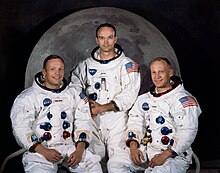Apollo 11 Neil Armstrong descends a ladder to become the first human to step onto the surface of the Moon | | | Mission type | Human lunar landing |
|---|
| Operator | NASA |
|---|
| COSPAR ID | CSM: 1969-059A
LM: 1959-059C |
|---|
| SATCAT no. | CSM: 4039
LM: 4041 |
|---|
| Mission duration | 8 days, 3 hours, 18 minutes, 35 seconds |
|---|
|
| | |
| Spacecraft | Apollo CSM-107
Apollo LM-5 |
|---|
| Manufacturer | CSM: North American Rockwell
LM: Grumman |
|---|
| Launch mass | CM: 5,560 kilograms (12,250 lb)
SM: 23,243 kilograms (51,243 lb)
LM: 15,095 kilograms (33,278 lb) |
|---|
|
| | |
| Crew size | 3 |
|---|
| Members | Neil A. Armstrong
Michael Collins
Edwin E. "Buzz" Aldrin, Jr. |
|---|
| Callsign | CSM: Columbia
LM: Eagle
On surface: Tranquility Base |
|---|
|
| | |
| Launch date | July 16, 1969, 13:32:00 (1969-07-16UTC13:32Z) UTC |
|---|
| Rocket | Saturn V SA-506 |
|---|
| Launch site | Kennedy LC-39A |
|---|
|
| | |
| Landing date | July 24, 1969, 16:50:35 (1969-07-24UTC16:50:36Z) UTC |
|---|
| Landing site | North Pacific Ocean
13°19′N 169°9′W / 13.317°N 169.150°W / 13.317; -169.150 (Apollo 11 splashdown) |
|---|
|
| | |
| Reference system | Selenocentric |
|---|
| Periselene altitude | 100.9 kilometers (54.5 nmi) |
|---|
| Aposelene altitude | 122.4 kilometers (66.1 nmi) |
|---|
| Inclination | 1.25 degrees |
|---|
| Period | 2 hours |
|---|
| Epoch | July 19, 1969, 21:44 UTC |
|---|
|
| | |
| Spacecraft component | Command/Service Module |
|---|
| Orbital insertion | July 19, 1969, 17:21:50 UTC |
|---|
| Orbital departure | July 22, 1969, 04:55:42 UTC |
|---|
| Orbits | 30 |
|---|
|
| Spacecraft component | Lunar Module |
|---|
| Landing date | July 20, 1969, 20:17:40 UTC |
|---|
| Return launch | July 21, 1969, 17:54 UTC |
|---|
| Landing site | Mare Tranquillitatis
0°40′27″N 23°28′23″E / 0.67408°N 23.47297°E / 0.67408; 23.47297[1] |
|---|
| Sample mass | 21.5 kilograms (47.5 lb) |
|---|
| Surface EVAs | 1 |
|---|
| EVA duration | 2 hours, 31 minutes 40 seconds |
|---|
|
| | |
| Docking date | July 16, 1969, 16:56:03 UTC |
|---|
| Undocking date | July 20, 1969, 17:44:00 UTC |
|---|
|
| Docking date | July 21, 1969, 21:35:00 UTC |
|---|
| Undocking date | July 21, 1969, 23:41:31 UTC |
|---|
|
| 

Left to right: Armstrong, Collins, Aldrin | |
Apollo 11 Neil Armstrong descends a ladder to become the first human to step onto the surface of the Moon | | | Mission type | Human lunar landing |
|---|
| Operator | NASA |
|---|
| COSPAR ID | CSM: 1969-059A
LM: 1959-059C |
|---|
| SATCAT no. | CSM: 4039
LM: 4041 |
|---|
| Mission duration | 8 days, 3 hours, 18 minutes, 35 seconds |
|---|
|
| | |
| Spacecraft | Apollo CSM-107
Apollo LM-5 |
|---|
| Manufacturer | CSM: North American Rockwell
LM: Grumman |
|---|
| Launch mass | CM: 5,560 kilograms (12,250 lb)
SM: 23,243 kilograms (51,243 lb)
LM: 15,095 kilograms (33,278 lb) |
|---|
|
| | |
| Crew size | 3 |
|---|
| Members | Neil A. Armstrong
Michael Collins
Edwin E. "Buzz" Aldrin, Jr. |
|---|
| Callsign | CSM: Columbia
LM: Eagle
On surface: Tranquility Base |
|---|
|
| | |
| Launch date | July 16, 1969, 13:32:00 (1969-07-16UTC13:32Z) UTC |
|---|
| Rocket | Saturn V SA-506 |
|---|
| Launch site | Kennedy LC-39A |
|---|
|
| | |
| Landing date | July 24, 1969, 16:50:35 (1969-07-24UTC16:50:36Z) UTC |
|---|
| Landing site | North Pacific Ocean
13°19′N 169°9′W / 13.317°N 169.150°W / 13.317; -169.150 (Apollo 11 splashdown) |
|---|
|
| | |
| Reference system | Selenocentric |
|---|
| Periselene altitude | 100.9 kilometers (54.5 nmi) |
|---|
| Aposelene altitude | 122.4 kilometers (66.1 nmi) |
|---|
| Inclination | 1.25 degrees |
|---|
| Period | 2 hours |
|---|
| Epoch | July 19, 1969, 21:44 UTC |
|---|
|
| | |
| Spacecraft component | Command/Service Module |
|---|
| Orbital insertion | July 19, 1969, 17:21:50 UTC |
|---|
| Orbital departure | July 22, 1969, 04:55:42 UTC |
|---|
| Orbits | 30 |
|---|
|
| Spacecraft component | Lunar Module |
|---|
| Landing date | July 20, 1969, 20:17:40 UTC |
|---|
| Return launch | July 21, 1969, 17:54 UTC |
|---|
| Landing site | Mare Tranquillitatis
0°40′27″N 23°28′23″E / 0.67408°N 23.47297°E / 0.67408; 23.47297[1] |
|---|
| Sample mass | 21.5 kilograms (47.5 lb) |
|---|
| Surface EVAs | 1 |
|---|
| EVA duration | 2 hours, 31 minutes 40 seconds |
|---|
|
| | |
| Docking date | July 16, 1969, 16:56:03 UTC |
|---|
| Undocking date | July 20, 1969, 17:44:00 UTC |
|---|
|
| Docking date | July 21, 1969, 21:35:00 UTC |
|---|
| Undocking date | July 21, 1969, 23:41:31 UTC |
|---|
|
| 

Left to right: Armstrong, Collins, Aldrin | |




